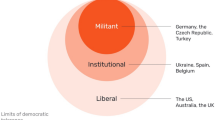Abstract
This essay identifies conceptual and institutional approaches within the Anglo-American liberal tradition for meeting security challenges without compromising constitutional and ethical principles. From its seventeenth century beginnings, political liberalism has confronted the problematic of the ‘state of exception,’ and has elaborated a repertoire of ideas and institutions for governing exigencies that remain instructive. In the first half of the twentieth century, responding to Carl Schmitt’s critique of liberal insufficiency, liberal thinkers, especially in the United States, sought to show how liberal polities can govern emergency situations within the scope of law. Following historical and political developments since the mid-twentieth century, the solutions proposed by such figures as Carl Joachim Friedrich and Clinton Rossiter no longer seem adequate to present conditions of prolonged emergency. Fresh institutional imagination is needed. The article concludes by offering four broad guidelines for allaying today’s tensions between security and liberty.
Zusammenfassung
Der Aufsatz identifiziert konzeptionelle und institutionelle Ansätze innerhalb der anglo-amerikanischen liberalen Theorie, die Sicherheitsbedürfnissen entsprechen ohne dabei verfassungsmäßige oder ethische Prinzipien zu korrumpieren. Seit seinen Anfängen im Siebzehnten Jahrhundert war der politische Liberalismus mit dem Problem des „Ausnahmezustandes“ konfrontiert und hat eine auch heute noch relevante Reihe von Ideen und Institutionen für entsprechende Anforderungen an die Regierung entwickelt. In der ersten Hälfte des Zwanzigsten Jahrhunderts haben insbesondere in den USA liberale Denker, in Reaktion auf Carls Schmitts Kritik an liberaler Insuffizienz, aufzuzeigen vermocht, wie liberale Institutionen Ausnahmezustände auf der Basis der bestehenden Rechtsordnung regeln können. Aufgrund der historischen und politischen Entwicklungen seit der Mitte des Zwanzigsten Jahrhunderts scheinen diese Lösungen, wie sie etwa von Carl Joachim Friedrich oder Clinton Rossiter vorgetragen worden sind, angesichts einer fortdauernden Ausnahmelage nicht mehr angemessen. Es bedarf neuer institutioneller Entwürfe. Der Artikel schließt, indem er vier weitgefasste Empfehlungen zur Einhegung der heutigen Spannungen zwischen Sicherheit und Freiheit vorstellt.
Similar content being viewed by others
Notes
Locke, John. (2008). Second Treatise of Government. In: Two Treatises of Government, Ed. Peter Laslett, 374–375 [Sec. 159–160]. Cambridge: Cambridge University Press.
Hamilton et al. 2001. Federalist #23. In: The Federalist, Eds. George W. Carey and James McClellan. Indianapolis: Liberty Fund.
Hamilton et al. (2001, p. 138). See also Federalist #21–26, 112–132.
This postulate underpins a remarkable 1918 US Government document, prepared by the order of the Attorney General and running more than 1000 pages, that chronicles “emergency legislation passed prior to December 1917” (Clark 1918). Excluding matters of military organization and finance, it focuses on statutes together with presidential orders and proclamations that authorized “the control and taking of private property” during the Revolutionary War, the wars of 1812 and 1847, the Civil War, and World War One. On this account, emergency acts are associated with moments that possess a clear boundary between war and peace.
By 1947, the Atomic Energy Act was complemented by a fundamental National Security Act that fashioned the still-existing main instruments of a national security state, including the Pentagon and its military organization, the National Security Council, and the Central Intelligence Agency (CIA), alongside federal government regulations that subjected government employees for the first-time to systematic loyalty reviews.
References
Agamben, Giorgio. 2005. State of Exception. Chicago: University of Chicago Press.
Clark, J. Reuben. 1918. Emergency Legislation Passed Prior to December, 1917, Dealing with the Control and Taking of Private Property for the Public Use, Benefit, or Welfare, Presidentil Proclamations and Executive Orders Thereunder, to and Including January 31, 2018, to Which is Added a Reprint of Analogous Legislation Since 1775. Washington, DC: Government Printing Office.
Friedrich, Carl. 1941. Constitutional Government and Democracy: Theory and Practice in Europe and America. Boston: Little, Brown & Co.
Hamilton, Alexander, John Jay, and James Madison. 2001. The Federalist. Indianapolis: Liberty Fund.
Hartigan, Richard Shelly. 2006. Lieber’s Code and the Law of War. New Brunswick: Transaction Publishers.
Locke, John. 2008. Two Treatises of Government. Cambridge: Cambridge University Press.
Manin, Bernard. 2008. The Emergency Paradigm and the New Terrorism: What if the End of Terrorism Was Not in Sight? In Les usages de la separation des pouvoirs, ed. Bianca Maria Fontana. Paris: Michel Houdiard.
Rossiter, Clinton. 1948. Constitutional Dictatorship: Crisis Government in the Modern Democracies. Princeton: Princeton University Press.
Rossiter, Clinton. 1950. War, Depression, and the Presidency 1933–1950. Social Research 17(4):417–440.
Schmitt, Carl. 2006. Political Theology: Four Chapters on the Concept of Sovereignty. Chicago: University of Chicago Press.
Schmitt, Carl. 2007. The Concept of the Political. Chicago: University of Chicago Press.
Schmitt, Carl. 2014. Dictatorship. Cambridge: Polity Press.
The Iraq Inquiry. 2016. www.iraqinquiry.org.uk/the-report. Accessed 11.11.2017.
Watkins, Fredrick Mundell. 1939. The Failure of Constitutional Emergency Powers Under the German Republic. Cambridge: Harvard University Press.
Watkins, Fredrick Mundell. 1940. The Problem of Constitutional Dictatorship. In Public Policy, ed. Carl Friedrich, Edward Mason. Cambridge: Harvard University Press.
Witt, John Fabian. 2012. Lincoln’s Code: The Laws of War. New York: Free Press.
Witt, John Fabian. 2015. To Save the Country. Yale: Yale Law School. Unpublished Manuscript.
Author information
Authors and Affiliations
Corresponding author
Rights and permissions
About this article
Cite this article
Atanassow, E., Katznelson, I. State of Exception in the Anglo-American Liberal Tradition. Z Politikwiss 28, 385–394 (2018). https://doi.org/10.1007/s41358-018-0153-0
Published:
Issue Date:
DOI: https://doi.org/10.1007/s41358-018-0153-0




